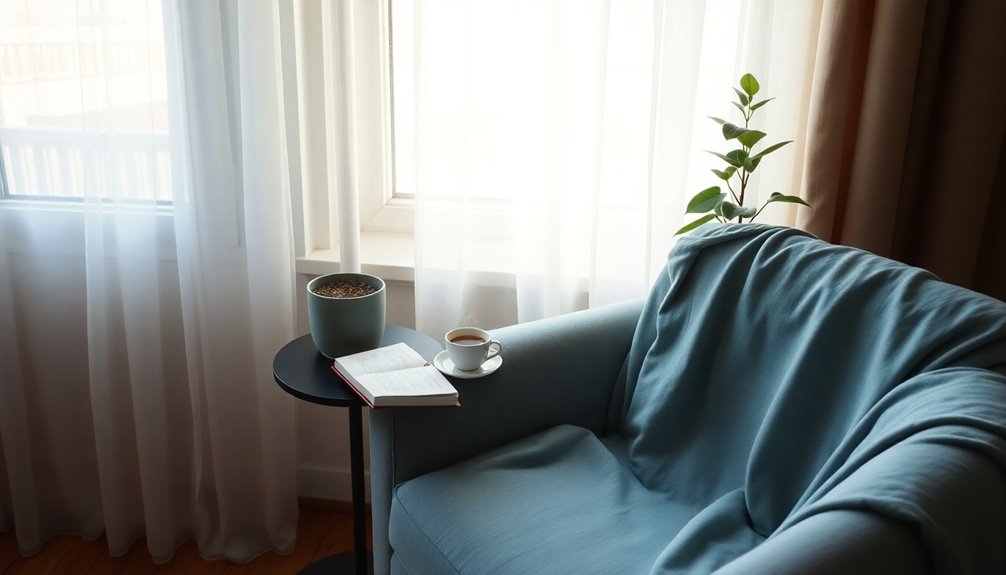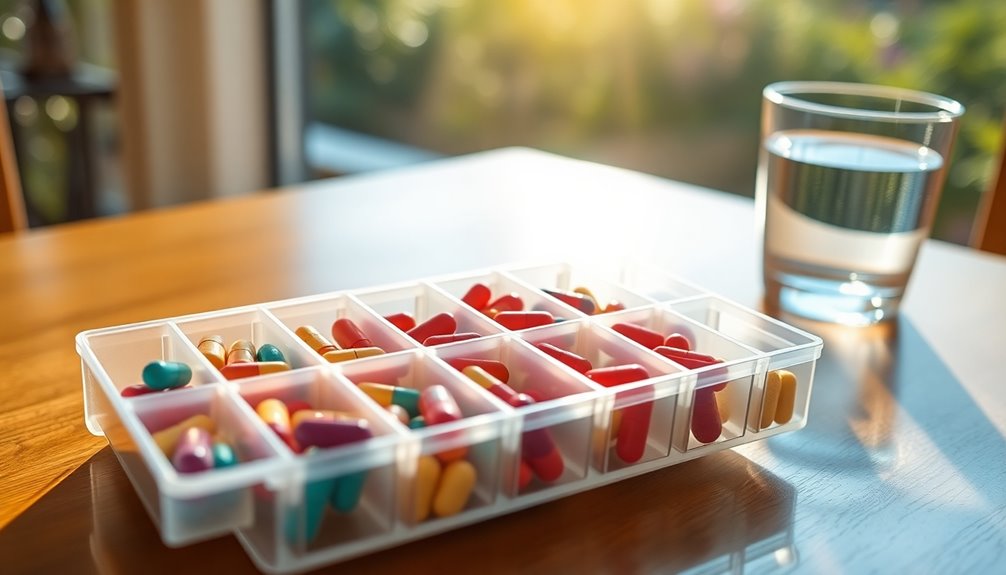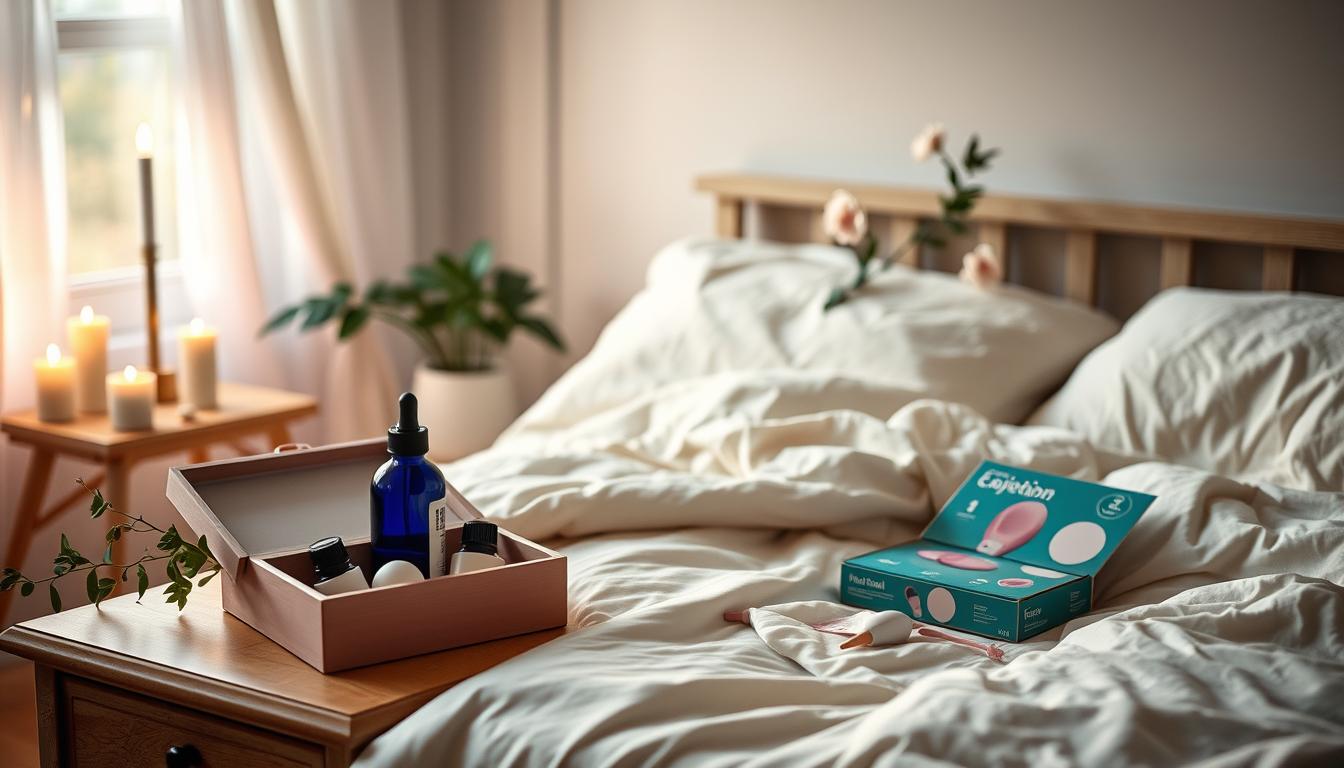To decrease your sex drive, focus on lifestyle changes and stress management. Regular exercise helps reduce stress and balance hormones. Incorporate relaxation techniques like mindfulness or yoga to manage anxiety, which can spike desire. A balanced diet with anti-aphrodisiacs, such as spearmint and licorice, can lower testosterone levels. Prioritize good sleep to maintain hormonal balance. If needed, consider seeking professional support through therapy or specialized sex therapy, which can address underlying issues. These approaches can effectively help, so keep exploring options that may fit your needs.
Key Takeaways
- Engage in regular physical exercise to enhance well-being and reduce overall stress levels, which can help lower libido.
- Practice stress-reduction techniques like mindfulness and yoga to manage anxiety-related spikes in sexual desire.
- Maintain a balanced diet with anti-aphrodisiacs such as spearmint and licorice to help decrease testosterone levels.
- Ensure adequate sleep of 7-9 hours to support hormonal balance and minimize stress impacts on libido.
- Consider consulting a healthcare provider to evaluate the effects of medications on sexual desire and explore alternative options.
Understanding Sex Drive

Sex drive, or libido, plays an essential role in our overall well-being and relationships. Your sexual desire is influenced by a mix of biological factors, like hormonal changes, particularly testosterone and estrogen, and mental health.
Stress and emotional aspects can lower libido, affecting relationship dynamics. Individual variations in sex drive can stem from age, energy levels, and overall physical health.
If you notice a high libido that disrupts daily life or leads to compulsive sexual behavior, it might signal a need for intervention. Life stages such as puberty or menopause greatly impact libido, highlighting the importance of understanding how these biological processes shape your sexual desire.
Additionally, the experience of narcissistic abuse can significantly affect one's libido, as emotional distress often leads to a decrease in sexual desire.
Balancing these influences is vital for managing your sexual health effectively.
Factors Influencing Libido

Understanding the various factors that influence libido can help you gain insight into your own sexual desire.
Biological factors, especially hormone levels like testosterone, play a significant role. These can change due to age, health conditions, and lifestyle factors.
Psychological factors, such as stress or emotional issues like anxiety and depression, can either boost or reduce your libido.
Social factors, including the quality of your relationships and societal attitudes toward sex, also shape your desire.
Additionally, lifestyle factors like diet, exercise, and substance use—like alcohol or drugs—can enhance or diminish sexual desire.
Finally, cultural influences from your upbringing and societal norms can affect how you perceive sexuality and your overall libido.
Lifestyle Changes to Reduce Libido

When you're looking to decrease your libido, making specific lifestyle changes can be incredibly effective. Here are four key adjustments you can make:
- Engage in regular physical exercise to promote well-being and manage stress, which helps reduce libido.
- Incorporate stress-reduction techniques like mindfulness or yoga into your routine, minimizing spikes in sexual desire linked to anxiety.
- Adopt a balanced diet rich in anti-aphrodisiacs such as spearmint and licorice to help lower testosterone levels.
- Prioritize adequate sleep, aiming for 7-9 hours each night to maintain hormonal balance and reduce stress.
Additionally, open communication with partners fosters emotional intimacy, which can further help manage libido.
Professional Support Options

If you find that lifestyle changes aren't enough to manage your libido, seeking professional support can be a game-changer. Individual therapy can help you explore underlying psychological factors affecting your sexual urges.
Couples therapy promotes open communication about libido management, enhancing relationship satisfaction. Specialized sex therapy offers targeted strategies to address sexual concerns and urges in a safe environment.
Additionally, support groups like Sex Addicts Anonymous provide peer-led assistance, fostering accountability and shared experiences for those grappling with hypersexuality.
With the rise of telehealth services, accessing mental health professionals for libido-related issues is now more convenient and discreet than ever. Embracing these options can empower you on your journey to healthier sexual well-being.
Evaluating Medication Effects

Medications you take can considerably influence your sex drive, often in unexpected ways. Here are some key effects to reflect upon:
- Antidepressants like SSRIs (e.g., Prozac) can lower libido due to neurotransmitter changes.
- Blood pressure medications, such as beta-blockers, can reduce sexual desire by affecting blood flow.
- Hormonal contraceptives may alter estrogen and progesterone levels, leading to decreased sexual desire in women.
- Withdrawal from certain medications can cause fluctuating libido as your body readjusts.
Consulting your healthcare provider is essential to evaluate how your medications impact your libido. They can help you explore alternatives or adjustments to minimize side effects while reflecting on your overall health and testosterone levels. Additionally, understanding the emotional support available can be vital in addressing changes in libido during this time.
Frequently Asked Questions
How Can I Suppress My Sex Drive?
If you're looking to suppress your sex drive, consider incorporating regular physical exercise into your routine. It helps enhance your overall well-being and reduces stress.
You might also try adding anaphrodisiac foods like spearmint and licorice to your diet.
Practicing mindfulness techniques, such as meditation or yoga, can improve your mental clarity and relaxation.
Don't forget to communicate openly with your partner about your feelings, fostering intimacy and understanding.
Why Is My Sex Drive so High?
Your high sex drive could stem from various factors.
Hormonal fluctuations, especially elevated testosterone, might be playing a role.
Psychological elements, like stress or anxiety, can also increase desire as a coping mechanism.
Additionally, relationship dynamics and emotional intimacy can enhance your libido.
Lifestyle choices, such as regular exercise and a balanced diet, contribute too.
It's crucial to reflect on these aspects to understand what's influencing your sexual desire.
How Can I Get Lost Interest in Sex?
Did you know that around 20% of adults report a decreased interest in sex at some point in their lives?
If you're looking to lose interest in sex, consider focusing on physical activities like exercise, which can redirect your energy.
Practicing mindfulness through meditation or yoga can also help you regain self-control.
Adding anti-aphrodisiac foods to your diet might further diminish your urges, creating a more balanced approach to your desires.
What Can Cause Sex Drive to Decrease?
Several factors can cause your sex drive to decrease. Hormonal imbalances, like low testosterone or estrogen, play a significant role.
Psychological issues, such as stress or anxiety, can also dampen your libido. Additionally, certain medications, including antidepressants, might lead to reduced sexual desire.
Lifestyle choices, like poor diet or lack of exercise, and relationship problems, such as communication issues, can further contribute to a decline in your sexual interest.
Conclusion
In your journey to decrease your sex drive, remember that balance is key, much like the scales of justice. By understanding the factors influencing your libido and making thoughtful lifestyle changes, you can regain control over your desires. Don't hesitate to seek professional support if needed, and be mindful of any medications that might impact your libido. Just as Odysseus navigated his challenges, you too can find your way to a more comfortable state of being.










